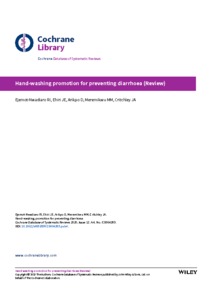Ejemot-Nwadiaro, RI; Ehiri, JE; Arikpo, D; Meremikwu, MM; Critchley, JA
(2021)
Hand-washing promotion for preventing diarrhoea.
Cochrane Database Syst Rev, 12.
CD004265.
ISSN 1469-493X
https://doi.org/10.1002/14651858.CD004265.pub4
SGUL Authors: Critchley, Julia
![[img]](https://openaccess.sgul.ac.uk/112942/1.hassmallThumbnailVersion/Ejemot-Nwadiaro_et_al-2021-Cochrane_Database_of_Systematic_Reviews.pdf)  Preview |
|
PDF
Published Version
Available under License ["licenses_description_publisher" not defined].
Download (1MB)
| Preview
|
Abstract
BACKGROUND: Diarrhoea accounts for 1.8 million deaths in children in low- and middle-income countries (LMICs). One of the identified strategies to prevent diarrhoea is hand washing. OBJECTIVES: To assess the effects of hand-washing promotion interventions on diarrhoeal episodes in children and adults. SEARCH METHODS: We searched CENTRAL, MEDLINE, Embase, nine other databases, the World Health Organization (WHO) International Clinical Trial Registry Platform (ICTRP), and metaRegister of Controlled Trials (mRCT) on 8 January 2020, together with reference checking, citation searching and contact with study authors to identify additional studies. SELECTION CRITERIA: Individually-randomized controlled trials (RCTs) and cluster-RCTs that compared the effects of hand-washing interventions on diarrhoea episodes in children and adults with no intervention. DATA COLLECTION AND ANALYSIS: Three review authors independently assessed trial eligibility, extracted data, and assessed risks of bias. We stratified the analyses for child day-care centres or schools, community, and hospital-based settings. Where appropriate, we pooled incidence rate ratios (IRRs) using the generic inverse variance method and a random-effects model with a 95% confidence interval (CI). We used the GRADE approach to assess the certainty of the evidence. MAIN RESULTS: We included 29 RCTs: 13 trials from child day-care centres or schools in mainly high-income countries (54,471 participants), 15 community-based trials in LMICs (29,347 participants), and one hospital-based trial among people with AIDS in a high-income country (148 participants). All the trials and follow-up assessments were of short-term duration. Hand-washing promotion (education activities, sometimes with provision of soap) at child day-care facilities or schools prevent around one-third of diarrhoea episodes in high-income countries (incidence rate ratio (IRR) 0.70, 95% CI 0.58 to 0.85; 9 trials, 4664 participants, high-certainty evidence) and may prevent a similar proportion in LMICs, but only two trials from urban Egypt and Kenya have evaluated this (IRR 0.66, 95% CI 0.43 to 0.99; 2 trials, 45,380 participants; low-certainty evidence). Only four trials reported measures of behaviour change, and the methods of data collection were susceptible to bias. In one trial from the USA hand-washing behaviour was reported to improve; and in the trial from Kenya that provided free soap, hand washing did not increase, but soap use did (data not pooled; 3 trials, 1845 participants; low-certainty evidence). Hand-washing promotion among communities in LMICs probably prevents around one-quarter of diarrhoea episodes (IRR 0.71, 95% CI 0.62 to 0.81; 9 trials, 15,950 participants; moderate-certainty evidence). However, six of these nine trials were from Asian settings, with only one trial from South America and two trials from sub-Saharan Africa. In seven trials, soap was provided free alongside hand-washing education, and the overall average effect size was larger than in the two trials which did not provide soap (soap provided: RR 0.66, 95% CI 0.58 to 0.75; 7 trials, 12,646 participants; education only: RR 0.84, 95% CI 0.67 to 1.05; 2 trials, 3304 participants). There was increased hand washing at major prompts (before eating or cooking, after visiting the toilet, or cleaning the baby's bottom) and increased compliance with hand-hygiene procedure (behavioural outcome) in the intervention groups compared with the control in community trials (data not pooled: 4 trials, 3591 participants; high-certainty evidence). Hand-washing promotion for the one trial conducted in a hospital among a high-risk population showed significant reduction in mean episodes of diarrhoea (1.68 fewer) in the intervention group (mean difference -1.68, 95% CI -1.93 to -1.43; 1 trial, 148 participants; moderate-certainty evidence). Hand-washing frequency increased to seven times a day in the intervention group versus three times a day in the control arm in this hospital trial (1 trial, 148 participants; moderate-certainty evidence). We found no trials evaluating the effects of hand-washing promotions on diarrhoea-related deaths or cost effectiveness. AUTHORS' CONCLUSIONS: Hand-washing promotion probably reduces diarrhoea episodes in both child day-care centres in high-income countries and among communities living in LMICs by about 30%. The included trials do not provide evidence about the long-term impact of the interventions.
| Item Type: |
Article
|
| Additional Information: |
Copyright © 2020 The Cochrane Collaboration. Published by John Wiley & Sons, Ltd. This review is published as a Cochrane Review in the Cochrane Database of Systematic Reviews 2020, Issue 12. Cochrane Reviews are regularly updated as new evidence emerges and in response to comments and criticisms, and the Cochrane Database of Systematic Reviews should be consulted for the most recent version of the Review. Ejemot-Nwadiaro RI, Ehiri JE, Arikpo D, Meremikwu MM, Critchley JA. Hand-washing promotion for preventing diarrhoea. Cochrane Database of Systematic Reviews 2020, Issue 12. Art. No.: CD004265. DOI: 10.1002/14651858.CD004265.pub4. |
| Keywords: |
11 Medical and Health Sciences, General & Internal Medicine |
| SGUL Research Institute / Research Centre: |
Academic Structure > Population Health Research Institute (INPH) |
| Journal or Publication Title: |
Cochrane Database Syst Rev |
| ISSN: |
1469-493X |
| Language: |
eng |
| Dates: |
| Date | Event |
|---|
| 6 January 2021 | Published | | 8 October 2020 | Accepted |
|
| Publisher License: |
Publisher's own licence |
| Projects: |
| Project ID | Funder | Funder ID |
|---|
| 300342-104 | UK Government | UNSPECIFIED |
|
| PubMed ID: |
33539552 |
 |
Go to PubMed abstract |
| URI: |
https://openaccess.sgul.ac.uk/id/eprint/112942 |
| Publisher's version: |
https://doi.org/10.1002/14651858.CD004265.pub4 |
Statistics
Item downloaded times since 15 Feb 2021.
Actions (login required)
 |
Edit Item |



